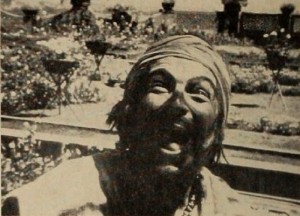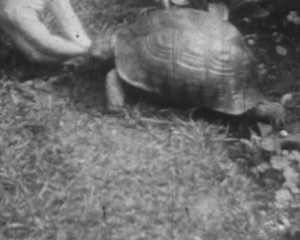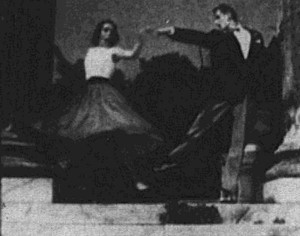"The One Man Band shows the filmer, Sid Laverents, playing about six instruments all at once, not to mention an old auto horn squeezed in between his knees that would compete well with Spike Jones, He explains what he is up to as a one man band, then plays two or three selections. A lively and entertaining film" PSA Journal, Sept. 1964, 51.

"J. N. Unwalla has chosen a simple morality tale for the theme of this colorful film from India. A beggar pleads for alms from passersby with poor success. There appears suddenly a figure who promises him wealth if he will eschew avarice and greed. As a shower of golden coins overflows his lap, however, he begs for "one dinar more." The point of the tale is proved when this evidence of his greed causes the wealth and the figure to disappear. Although employing interesting camera viewpoints to give diversity, the single setting in a Bombay courtyard suggests a stage play rather than a motion picture." Movie Makers, Dec. 1949, 470.

"Amateur filmmaker, cinema historian and railway engineer H.A.V. Bulleid documents a day in the life of the Bulleid family at Wood House on Hadley Common in Hertfordshire. In the morning, Marjorie Bulleid walks on the common with her two youngest boys and the family dogs, as trains pass by on the nearby Great Northern Railway Line. Returning home, the dogs continue playing in the backyard, where the family cook hand feeds a large cat. Later that morning, O.V.S. (Oliver) Bulleid takes the family on a leisurely drive through the highways and byways of Hertfordshire, returning home for afternoon tea in the backyard. After tea, the family play with their pets - dogs, cats and a turtle - and pose for photographs" (EAFA Database).

"Once Upon a Rose is romantic fantasy of a high and handsome order. In it a young gallant on a walking tour comes upon a lovely pleasance leading, at its far end, to a columned Grecian portico and the statue of a goddess. Starting to dance upon the wide stone steps, he soon hears footballs echoing behind him. The goddess has come to life and, in a series of gay modern dances, she and the boy make tender and romantic love. Then, like the princess in the fairy tale, she is again transfigured into stone—and the young man is left with only a rose to mark her memory. Now...except for brief opening and closing sequences, all of this action takes place in the single setting of the Grecian porch. To be sure, the choreography by Jimmy Inman (who also plays the young gallant) is lively and kinetic. And Mary Jo Bishop is graceful as the girl. But the film's real rhythmic flow is due in its major part to the imagination and skill of the producer, William H. Eddy. It is from his fluid camera that there blossoms this rose-scented romance which never was" PSA Journal, Jan. 1955, 49.
"Once a Gentleman. When businessman Jones starts home he notes a damsel in distress on the street and offers to fix her flat tire. After a few drinks-in-her apartment later, he receives a letter demanding $1000 or his wife will be told of what is going on. But the blackmailer didn't count on Jones' deductive powers to find out just what has been going on. The film also won the MPD Club Film Award" PSA Journal, Sept. 1966, 35.
"Groups of people assemble in town, meeting and chatting on the street. At the beach, women feed the seagulls, go on a fairground boat ride, and they feed chips to the gulls both on the beach and from a wooden pier, A family assemble in the garden - the girls are wearing school uniform - and sit together. There is a shot of horned cattle in a field, and there is a garden where an old man mows his lawn, while a very old man receives a buttonhole. The location shifts to a clifftop walk. In what seems like an earlier period, very formally dressed people play with a small child, and sit in deckchairs" (NWFA Online Database).
Total Pages: 299